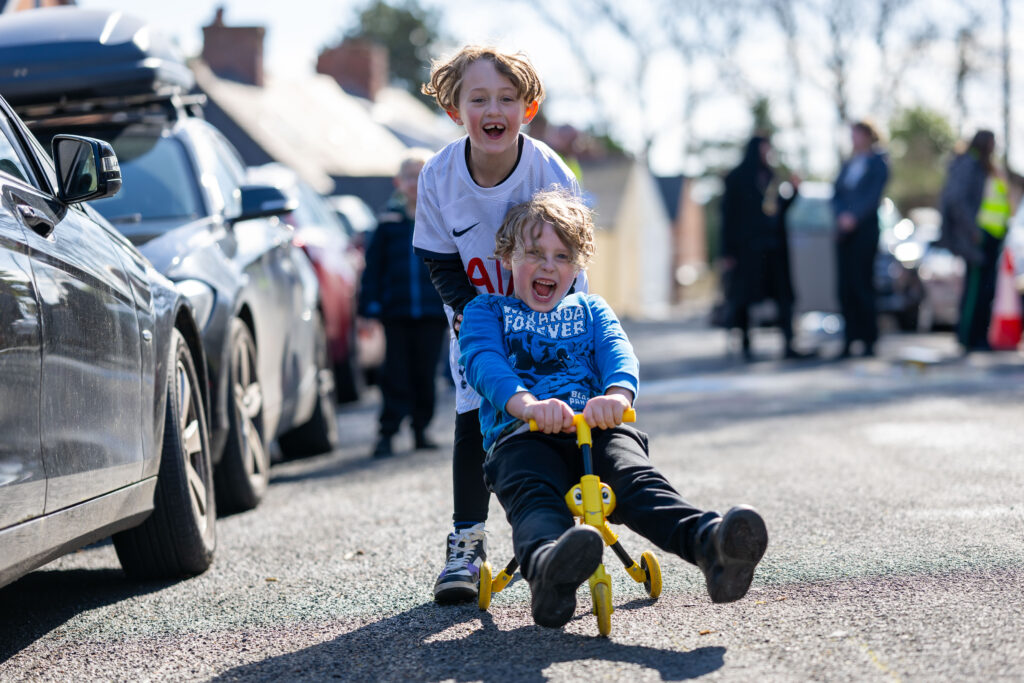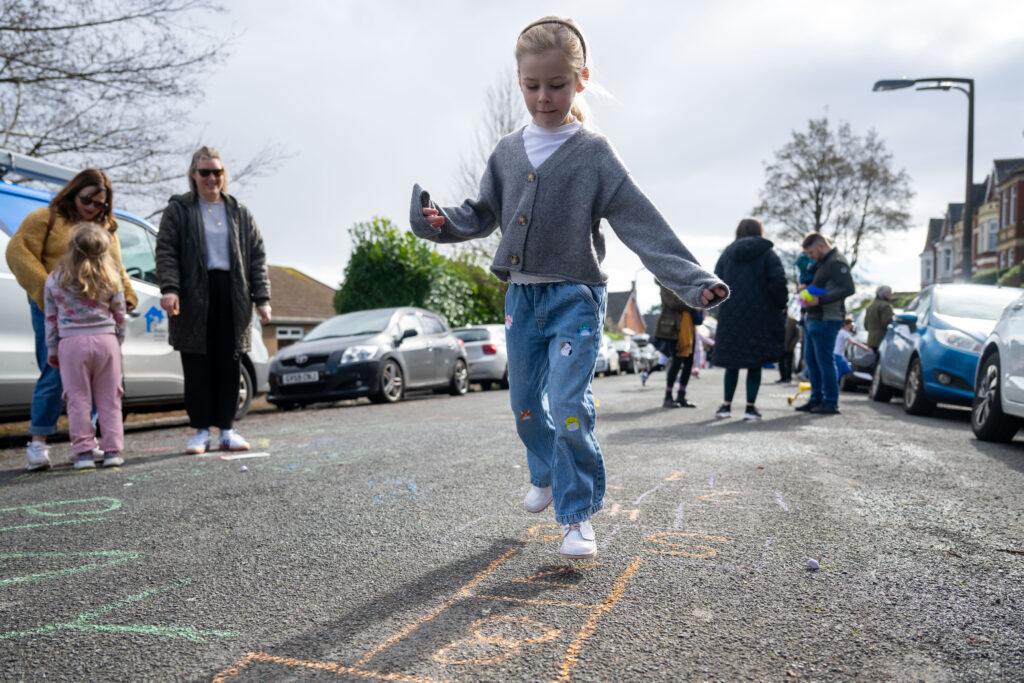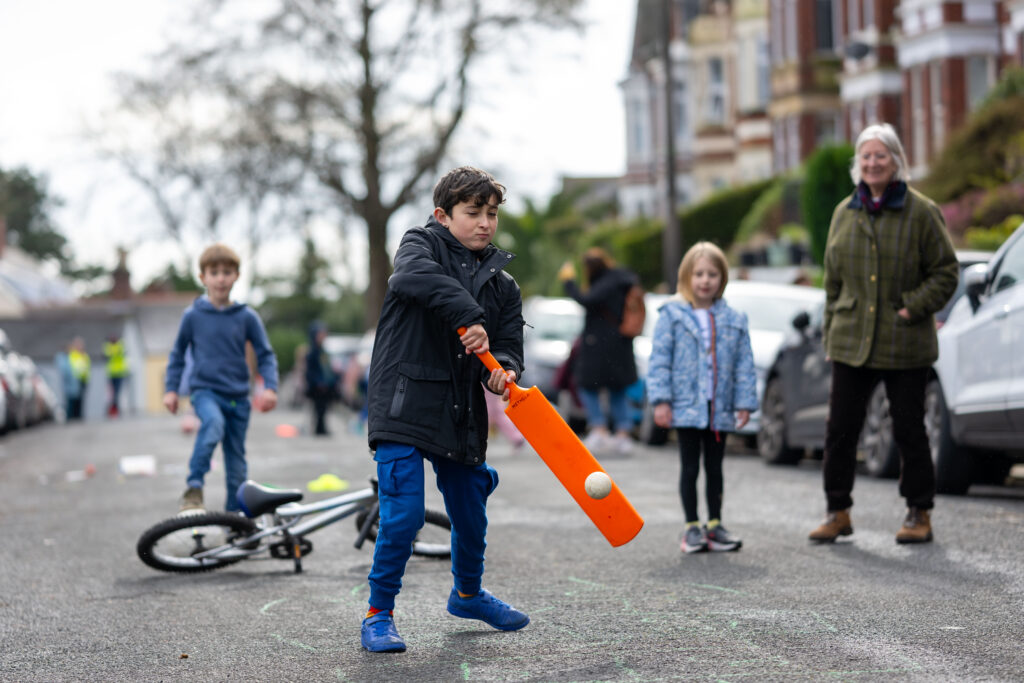Support communities to fight climate emergency, says Future Generations Commissioner as he launches call for all councils in Wales to be net zero
5/3/24
Supporting community climate action is essential if local councils are to help Wales cut climate-warming carbon emissions and reach net zero, the Future Generations Commissioner said today. [Tuesday, March 5.]

Derek Walker told local authorities they have the power to unlock significant collective change, if they enable and remove barriers from some of the passionate people and groups making a difference across Wales.
Speaking at an event, Mr Walker urged all local authorities to sign up to the UN-backed Race to Zero initiative which aims to halve harmful global emissions by 2030 and to build a better future which is healthier, greener, and fairer.
Net zero will happen when the amount of carbon we add to the atmosphere is no more than the amount removed, ie climate change is no longer caused by human activity.
Around half of Wales is on a path to join Race to Zero including Cardiff Capital Region, the three Welsh national parks, some local authorities, and businesses.
Out of 22 local authorities in Wales, 19 have declared a climate emergency, and most have a climate action plan. In Climate Emergency UK’s 2021 scorecard exercise, Welsh local authorities’ climate action plans received an average score of 31%, below the national average of 50%.
Following the lead of Bannau Brycheiniog national park’s new climate mission Dyfodol y Bannau, climate champions in local communities across the area have formed Bannau Brycheiniog Community Race to Zero as a partnership with the National Park Authority. The community network will focus on energy, food, and public transport with the aim of decarbonising while also lowering the costs of living for local people. Projects cover community-owned energy generation, creating 1,200 acres of local food growing and zero carbon local transport.
In Powys, the Public Services Board is aligning its work with Race to Zero and developing a local stakeholder forum to bring together businesses, Town and Community Councils, farmers, community groups and others to be a sounding board for an emerging county-wide climate action plan.
The commissioner brought together local authorities to explore how Race to Zero can help Wales achieve the ‘globally responsible Wales’ goal at the heart of the Well-being of Future Generations Act and be a practical framework to support positive change in every part of Wales.
In November, he published his strategy Cymru Can, committing to supporting the public sector to achieve the net zero by 2030 ambition in Net Zero Wales while also supporting the pathway to a nature positive Wales by 2030.
Public bodies in Wales have a duty to report their own operational emissions each year through the Welsh Government reporting framework, but this is only a small part of the picture. Race to Zero has a broader area-based approach looking at emissions across a whole local area.
Mr Walker said public bodies were in a unique position to shape and influence the future of Wales by working with local communities and businesses and attracting investment tailored to local needs.
He said: “Reaching net zero, which is crucial for a liveable planet for our children and grandchildren, is going to require a team effort.
“How we move around our local area, how we feed ourselves and our families or heat our homes, all have a significant impact in the kind of Wales and world we’ll have in the future, and everyone must be ready to collaborate, and involving people in Race to Zero is key to finding solutions that work.
“I consistently hear from communities that want to be empowered to act on the things that matter most to them – and climate change is up there at the top of that list, and they have the projects and ideas that can support the increase in scale and pace that we need across Wales.
“Public bodies including local councils are stretched, so my message to them is to flex their muscles and encourage climate-friendly action to happen in our communities – whether that be providing an area of land for planting or food growing, enabling community energy schemes, supporting safe, accessible active travel or engaging with local business networks to support a greener, local economy.
“Through our regional partnership arrangements, we already have the structures in place for this area-based approach to work. We’re looking forward to working with them, our communities and businesses in Wales to get to net zero faster. There is no time to lose.”
The commissioner is asking local councils, via Corporate Joint Committees, to join Race to Zero. You can find out more information here.
Case study - Play Street pilot enables children to play with neighbours, while helping in the race to net zero
Play Streets, or Playing Out sessions, are neighbour-led temporary road closures, popular across the UK, creating a safe space for children to play freely together on their doorstep.
Vale of Glamorgan Council’s Vale Play team have been working with Play Wales and residents to implement street closures for outdoor play at two locations in Barry.
Participation in play has known long-term preventative health and well-being benefits and it’s hoped Play Streets will help improve on air quality by reducing carbon emissions during the road closure period, contributing to the council’s Project Zero initiative to become carbon neutral by 2030.
Residents are provided with signage, hi-vis wear, a small play-kit, and information cards to carry out the road closure and if the pilot scheme proves successful, play-related road closures could be made available for eligible roads across the Vale.

Aoife Blight, a resident who coordinates one of the sessions, said the pilot scheme had been ‘transformative’ for her neighbourhood.
The mother-of-two had been running informal, pop-up Play Streets for months before the scheme started, and engaged with neighbours, writing letters and having in-person and online meetings to gauge the demand and support for involvement with the pilot.
She said: “I’m so happy to say that everyone was behind the idea and have really got behind the fun of it all.
“The traffic-free space means the kids have the freedom to safely explore their street and have mini-adventures with their neighbours.
“We’ve seen kids learning to cycle, develop their skateboarding and skating skills, drawing beautiful chalk pictures on the road, sharing food (real and imaginary) and generally just having fun with the people they are going to grow up with.
“My kids really look forward to it and so do I – it’s a great chance for our community to get together and to get to know each other, too.
“Now, when we see neighbours on the street, people quite often stop for a chat, rather than just a hurried nod.
“We’ve been very lucky to get the opportunity to come out to play and we really hope this scheme can continue and spread to more streets across the Vale of Glamorgan.“
Joanne Jones, Senior Healthy Living Officer at the Vale of Glamorgan Council, said: “The pilot Play Street projects have had a huge impact on their communities, not only increasing opportunities for children to play but also for neighbours of all ages to come together.
“The team is excited at the prospect of now supporting similar initiatives elsewhere in the Vale.”

NOTES TO EDITORS
Race to Zero is the world’s largest coalition of non-state actors taking ambitious and robust 1.5-degree-aligned action to halve global emissions by 2030.
Race to Zero Cymru aims for Wakes to be the first Race to Zero nation, aligning the whole of Welsh society in the mission, with comprehensive and ambitious climate plans including all levels of government as well as Wales, key institutions and organisations.
More than 11,000 non-state members have joined Race to Zero, representing 8,307 companies, 595 financial institutions, 52 regions, 1136 cities, 1,125 educational institutions, 65 healthcare institutions and 29 other organisations, to collectively halve global emissions by 2030.
Wales (and Scotland) are members of Race to Zero as part of the Under2 Coalition of high ambition countries, and organisations signed up or on a pathway include Cardiff Capital Region, which covers 10 of Wales’ 22 local authorities.
Climate Emergency UK assessed all UK councils on the actions they’ve taken towards net zero. The Scorecard assessment consists of 91 questions or less, depending on council type, across seven different sections, created in consultation with more than 90 different organisations and individuals. Each council was marked against these criteria and given a right to reply before the scores underwent a final audit. This work was completed between January and August 2023.
Cymru is the only country in the world with a Well-being of Future Generations Act and the Future Generations Commissioner, Derek Walker, has a role to support and challenge public bodies, including councils, health boards and Welsh Government, to protect the future as they tackle today’s problems.
In November 2023, the commissioner launched his long-term strategy, Cymru Can, putting his team’s focus on five mission areas – ensuring the legislation is working harder and having impact in people’s everyday lives; responding to the climate and nature emergencies; more action to prevent ill health; a well-being economy; and protecting and enhancing culture and the Welsh language.
Wales’ seven well-being goals under the Act have already created change from the scrapping of a £1.4bn motorway that would have torn through a nature reserve, leading to a new transport plan; a progressive school curriculum and a new way to define prosperity – valuing green, low-carbon, fair work over a rise in GDP. The approach has inspired everyone from the UN to countries from Ireland to Japan.